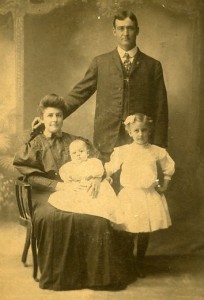#140 – Dick Bernard: 500 years
Happy New Year, and new Decade!
2009 ends today. Much of this past year my personal endeavors have been around family history projects.
Since late summer, I’ve been tackling an immense task: trying to summarize 400 years of the recorded history of my average and ordinary French-Canadian families experience in North America. (My father was French-Canadian, his ancestry going back to the early 1600s in what is now known as Quebec.) I’m nearing completion of the project, which I’m entitling “The First 300 Years”, summarizing the most difficult to access part: the 300 years preceding my Dad’s birth December 22, 1907. (Quebec was established in July, 1608.)
Of course, those 400 years are just a moment in the existence of humanity; 400 years in France is modern history. But in North American and American history, 400 years is a long, long time.
Normally a family history project about an ordinary family is plagued by a lack of data. For me, I was plagued by so much data it was difficult to know where to start, and what to include or leave out. I finally broke that psychological log-jam, and I think the end result (which ultimately will be on the web, perhaps in February of 2010), will probably be about 150 pages of work.
I thought I had completed the project of summarizing those 300 years in mid-November, 2009, and, in fact, I printed the first copy in mid-November, and sent out the draft to 35 people during that same week.
During that very week in November, it happened that the television was carrying a series of commercials produced by a natural gas producing association, and a couple of times their ad featured a young Mom and her little girl invited, by her Mom, to blow out 100 candles, each symbolizing a year of natural gas left for we consumers. Of course, blowing out those 100 candles would be quite a chore for a little girl, and that was noted by the Mom.
The point of that commercial, and the other companion ads, was that there is at least 100 years worth of natural gas left in this country; suggesting this to be a long, long time. “Not to worry.” I watched the screen, which is next to our natural gas fireplace, and I thought of this little girl and her Mom in context with the 400 years I’d been reviewing for the prior few months, and the hundreds and thousands of years of earlier human history.
What a distinction.
My Dad was born 102 years ago…when he came on the scene there was scarcely any use of that resource, natural gas. In fact, his ancestors (and mine) in North America likely didn’t know there was such a resource until late in the 19th century, 250 years into their arrival in the New World.
Now the ad was saying that we had about 100 years left of that single resource, and directly implying that 100 years is a very long time.
I wanted to see that ad again, so that I could write exactly what the screen “Mom” was saying to her “daughter”, but it didn’t air again. Perhaps someone thought better of the idea of using that little girl as a prop for a resource that was rapidly disappearing. I don’t know.
Having looked at my family history from 1608-1907 – I’m 12th generation in North America; and knowing my family history from 1907 to the present; and knowing how we have become a society that lives for the moment, and really relies on fantasy views of the present and future reality, I wonder what’s ahead for us as a society in the next, very short, century.
That little girl in the commercial, and most likely her stage Mom, will own the results of our helter-skelter squandering of our earth.
Meanwhile, that natural gas fireplace by the television continues to bring warmth….
We can live in the past; we can pretend that today and tomorrow are all that matters; I hope we all look far more to the future consequences of present actions.
We can start by demanding that our lawmakers take a long-term and global view as they make policy that will affect the generations that follow us.
Then, we might have a Happy New Year.
And give those who follow some chance for many Happy New Years to come.


